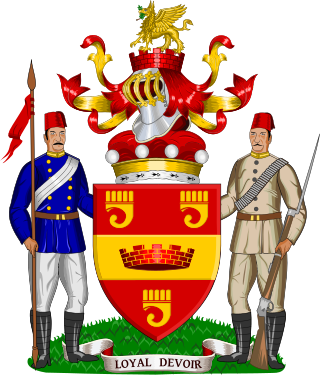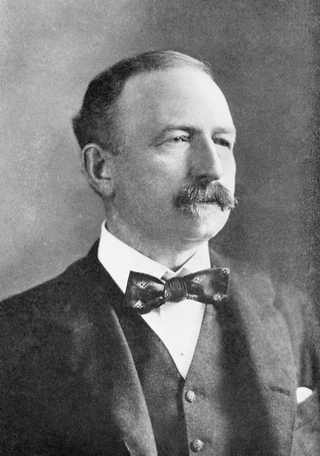Arms
 |
|
Baron Kenswood, of St Marylebone in the County of London, [1] is a title in the Peerage of the United Kingdom. It was created in 1951 for the professional violinist and welfare worker for the blind, Ernest Whitfield. As of 2017 [update] the title is held by his grandson, the third Baron, who succeeded in 2016.
The heir presumptive is the present holder's younger brother Hon. Anthony John Whitfield (b. 1957)
The heir presumptive's heir, and the next heir-in-line, is his son Peter Daniel Whitfield (b. 1981) [2]
 |
|
This article needs additional citations for verification .(September 2014) |

Baron Grenfell, of Kilvey in the County of Glamorgan, is a title in the Peerage of the United Kingdom. It was created on 15 July 1902 for the military commander Sir Francis Grenfell. His eldest son, the second Baron, was Deputy Speaker of the House of Lords and Chairman of Committees from 1963 to 1976. As of 2010 the title is held by the latter's son, the third Baron, who succeeded in 1976. He previously worked for the World Bank. Lord Grenfell lost his seat in the House of Lords after the passing of the House of Lords Act 1999. However, in 2000 he was made a life peer as Baron Grenfell of Kilvey, of Kilvey in the County of Swansea, and was able to return to the House of Lords.

Baron Grimston of Westbury, of Westbury in the County of Wiltshire, is a title in the Peerage of the United Kingdom. It was created in 1964 for the Conservative politician and former Deputy Speaker of the House of Commons, Sir Robert Grimston, 1st Baronet. He had already been created a baronet in 1952. Grimston was the son of Reverend Canon the Hon. Robert Grimston, third son of James Grimston, 2nd Earl of Verulam. As of 2017 the titles are held by his grandson, the third Baron, who succeeded his father in 2003.
Baron Addington, of Addington in the County of Buckingham, is a title in the Peerage of the United Kingdom. It was created on 22 July 1887 for the businessman and Conservative Member of Parliament, John Hubbard. He was head of the firm of John Hubbard & Co and also sat as a Member of Parliament for Buckingham and the City of London. His eldest son, the second Baron, was a partner in the family firm and represented Buckingham in the House of Commons as a Conservative. He was succeeded by his eldest son, the third Baron. He was three times Mayor of Buckingham. On the death of his younger brother, the fourth Baron, the line of the eldest son of the first Baron failed. The title passed to their first cousin once removed, the fifth Baron. He was the grandson of Cecil John Hubbard, third son of the first Baron. As of 2018, the title is held by his eldest son, the sixth Baron. He is one of the ninety elected hereditary peers that remain in the House of Lords after the passing of the House of Lords Act of 1999. Lord Addington sits on the Liberal Democrat benches.
Baron Ogmore, of Bridgend in the County of Glamorgan, is a title in the Peerage of the United Kingdom. It was created on 10 July 1950 for David Rees-Williams, a Welsh Labour, and later Liberal, politician. As of 2020, the title is held by his grandson, the fourth Baron, who succeeded his father in that year.
Baron Keyes, of Zeebrugge, and Dover in the County of Kent, is a title in the Peerage of the United Kingdom. It was created in 1943 for the prominent naval commander Admiral of the Fleet Sir Roger Keyes, 1st Baronet. He is chiefly remembered for his role in the Zeebrugge Raid in 1918, an attempt by the Royal Navy to neutralize the Belgian port of Zeebrugge which was used as a base for German submarine attacks on Allied shipping. Keyes had already been created a Baronet, of Zeebrugge, and of Dover in the County of Kent, in the Baronetage of the United Kingdom in 1919. As of 2010 the titles are held by his grandson, the third Baron, who succeeded his father in 2005. He does not use his title.

Baron Wrenbury, of Old Castle, Dallington in the County of Sussex, is a title in the Peerage of the United Kingdom. It was created in 1915 for the barrister and judge Sir Henry Buckley. He served as a Judge of the High Court of Justice and as a Lord Justice of Appeal. As of 2014 the title is held by his great-grandson, the fourth Baron, who succeeded his father in 2014. The Hon. Sir Denys Buckley, younger son of the first Baron, was also a Judge of the High Court of Justice and Lord Justice of Appeal.

Baron Shaughnessy, of the City of Montreal in the Dominion of Canada and of Ashford in the County of Limerick, is a title in the Peerage of the United Kingdom. It was created in 1916 for the Milwaukee born businessman Thomas Shaughnessy, president of the Canadian Pacific Railway Company. He was succeeded by his eldest son, the second Baron, a Director of the CPR and of the Canadian Bank of Commerce. His son, the third Baron, was a businessman and was also active in the House of Lords. However, he lost his hereditary seat in parliament after the House of Lords Act 1999.
Baron Simon of Wythenshawe, of Didsbury in the City of Manchester, is a title in the Peerage of the United Kingdom. It was created in 1947 for Ernest Simon, an industrialist and politician, and his heirs male. He had previously served as a member of the Manchester City Council and as Lord Mayor of Manchester and is chiefly remembered for the slum clearances and housing projects he initiated in the city, notably the Wythenshawe estate. Simon also sat as a Liberal Member of Parliament for Manchester Withington, but joined the Labour Party in 1946. As of 2022 the title is held by his granddaughter Matilda Simon, the third Baron, who succeeded her father in 2002, and came out in 2015 as the first openly transgender peer in the United Kingdom.

Baron Piercy, of Burford in the County of Oxford, is a title in the Peerage of the United Kingdom. It was created on 14 November 1945 for the economist, financier and civil servant William Piercy. As of 2010 the title is held by his grandson, the third Baron, who succeeded his father in 1981.

Baron Morris, of St John's in the Dominion of Newfoundland and of the City of Waterford, is a hereditary barony in the Peerage of the United Kingdom which was created on 15 January 1918 for the lawyer and politician Sir Edward Morris upon his retirement as Prime Minister of Newfoundland.
Baron Milne, of Salonika and of Rubislaw in the County of Aberdeen, is a title in the Peerage of the United Kingdom. It was created on 26 January 1933 for Field Marshal Sir George Milne. He had previously served as Chief of the Imperial General Staff. As of 2009 the title is held by his grandson, the third Baron, who succeeded his father in 2005.
Baron McNair, of Gleniffer in the County of Renfrew, is a title in the Peerage of the United Kingdom. It was created on 4 August 1955 for the lawyer and judge Sir Arnold McNair. He was the first President of the European Court of Human Rights. As of 2010 the title is held by his grandson, the third Baron, who succeeded his father in 1989.
Baron Basing, of Basing Byflete and of Hoddington, both in the County of Southampton, is a title in the Peerage of the United Kingdom. It was created in 1887 for the Conservative politician and former President of the Local Government Board, George Sclater-Booth. On his death the title passed to his eldest son, the second Baron, and then to his son, the third Baron. On the latter's death in 1983 this line of the family failed. The title was inherited by the late Baron's first cousin, the fourth Baron. He was the son of Charles Lutle Sclater-Booth, second son of the first Baron. As of 2010 the title is held by the fourth Baron's grandson, the sixth Baron, who succeeded his father in 2007.
Baron Brocket, of Brocket Hall in the County of Hertford, is a title in the Peerage of the United Kingdom. It was created on 19 January 1933 for the businessman Sir Charles Nall-Cain, 1st Baronet. He was chairman of the brewing firm of Robert Cain & Sons, which had been founded by his father Robert Cain. Before his elevation to the peerage, Nall-Cain had been created a baronet, of the Node, in 1921. His son, the second Baron, represented Wavertree in the House of Commons as a Conservative. As of 2017 the titles are held by the latter's grandson, the third Baron, who succeeded in 1967.
Baron Burden, of Hazlebarrow in the County of Derby, is a title in the Peerage of the United Kingdom. It was created in 1950 for the Labour politician Thomas Burden. He had previously represented Sheffield Park in the House of Commons and after his elevation to the peerage served as a Lord-in-waiting from 1950 to 1951 in the Labour administration of Clement Attlee.
Baron Crawshaw, of Crawshaw in the County Palatine of Lancaster and of Whatton in the County of Leicester is a title in the Peerage of the United Kingdom. It was created on 25 August 1892 for Sir Thomas Brooks, 1st Baronet. He notably served as High Sheriff of Lancashire in 1884. Brooks had already been created a baronet in the Baronetage of the United Kingdom, of Crawshaw Hall and Whatton House, on 9 February 1891. As of 2013 the titles are held by his great-grandson, the fifth Baron, who succeeded his elder brother in 1997.
Baron Cochrane of Cults, of Crawford Priory in the County of Fife, is a title in the Peerage of the United Kingdom. It was created in 1919 for the Liberal Unionist politician and former Under-Secretary of State for the Home Department, the Hon. Thomas Cochrane. He was the second and youngest son of Thomas Barnes Cochrane, 11th Earl of Dundonald. As of 2017 the title is held by the first Baron's great-grandson, the fifth Baron, who succeeded his father in that year. The fifth Baron is also third in line to the Earl of Dundonald.
Baron Rootes, of Ramsbury in the County of Wiltshire, is a title in the Peerage of the United Kingdom. It was created on 16 February 1959 for the businessman Sir William Rootes. He was head of the motor car manufacturer Rootes Ltd and following his death, his son, William Geoffrey Rootes, became the new chairman in 1964. The company eventually was acquired during the late 1960s by Chrysler and the company was renamed Chrysler UK in 1970. As of 2010 the title is held by his grandson, the third Baron, who succeeded his father in 1992.
Baron Renwick, of Coombe in the County of Surrey, is a title in the Peerage of the United Kingdom. It was created on 23 December 1964 for the businessman and public servant, Sir Robert Renwick, 2nd Baronet. He notably worked for the Air Ministry and the Ministry of Aircraft Production during the Second World War. The Renwick Baronetcy, of Coombe in the County of Surrey, was created in the Baronetage of the United Kingdom on 28 June 1927 for his father, Harry Renwick. As of 2020 the titles are held by the first Baron's grandson, the third Baron, who succeeded in that year. The second baron was active in the House of Lords until the House of Lords Act 1999, when he lost his seat in parliament.
Ernest Albert Whitfield, 1st Baron Kenswood, was a British violinist and welfare worker for the blind.